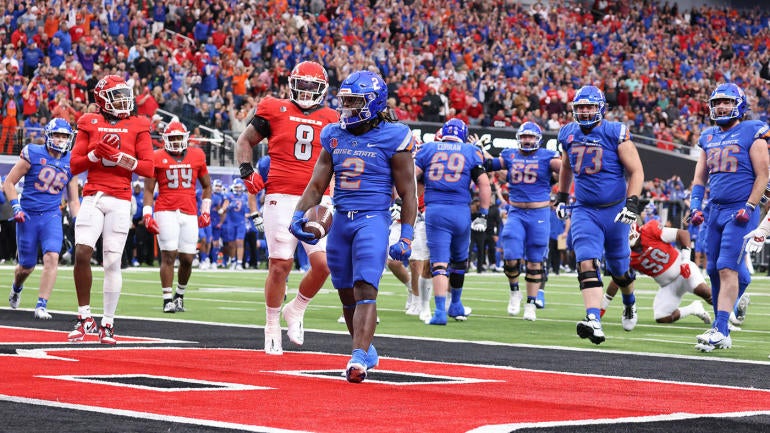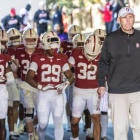
The Pac-12 rose from near death on Thursday and welcomed four new schools: Boise State, Fresno State, San Diego State and Colorado State. They join Oregon State and Washington State as member institutions starting with the 2026 season.
The move locks down four of the top brands in the Mountain West as the league tries to reestablish itself as a national power. However, there are still a number of questions the remain as college football's next great realignment sets off. Like the last one, it could have major implications all the way from FBS to Division III when the dust settles.
Here are the biggest questions that came out after the Pac-12 added four schools from the Mountain West on Thursday.
Why these four schools?
The factors driving the Pac-12's realignment mirror many of the discussions that have happened in the past. The primary focus for the league is revenue, so finding the biggest and most valuable brands took center stage. By almost every financial metric, Boise State, Colorado State, San Diego State and Fresno State were top five. The final decisions ultimately came down to Oregon State and Washington State.
"I was pleased with the configuration and actually the metrics," San Diego State president Adela de la Torre said. "The metrics spoke to the decision-making process, and they were very objective in that sense. In my mind, it was the best four that were selected."
Perhaps the most surprising Mountain West brand left out was UNLV. The Rebels have invested heavily into football and now play at the Raiders' Allegiant Stadium. UNLV coach Barry Odom helped lead the program to a Mountain West Championship Game appearance in 2023, and the Rebels are fresh off a 27-7 win against Houston. But separating in-state programs UNLV and Nevada could be a political complication, according to Yahoo Sports.
Will the "new" Pac-12 have Power Five status?
While the new conference will hold the Pac-12 branding, it does not hold all the benefits of the league. The conference lost autonomy status in April, which is a legal signifier of being a power conference. Additionally, the College Football Playoff removed an auto-bid slot for a fifth power-conference champion, creating instead five total slots, one of which will go to a Group of Five team. There's been no inclination that the model will change, though it will be up for discussion before a new CFP contract is signed in 2026.
However, there's no formal definition of Power Five; conferences exist on more of a spectrum. The Big Ten and SEC generate nearly $70 million per school per year in television money alone. The ACC and Big 12 clear $30 million. The AAC is the leader among non-power schools at just under $10 million. The Mountain West was at approximately $3.5 million per school. Pushing closer to the ACC and Big 12 is possible and would at least help make a case.
When will the teams move? How will it be funded?
The four Mountain West schools will continue to participate in the league through the 2025 season. They will officially enter the Pac-12 Conference on July 1, 2026.
Buying out one year of football for four schools will cost approximately $113 million, according to CBS Sports' Dennis Dodd. The Pac-12 has a "war chest" of $250 million available, which includes NCAA Tournament units and existing contracts. Some of this money could be used to help pay off the fines and exit fees.
What other schools could be targeted?
Considering the amount of money it will cost for the four schools to get out of the league, the Pac-12 will set its sights high to create an upgraded conference. Top brands in the American Athletic Conference could be targets, including Memphis, Tulane or UTSA. After landing six schools from the West Coast, geography will likely not be a strong driver as the conference attempts to maximize its financial value. However, convincing schools that the Pac-12 will provide a bigger benefit than the AAC will be a challenge. If not, the Pac-12 could circle back to the Mountain West or make pitches to other top Group of Five programs.
Why must the Pac-12 get to eight schools?
Under NCAA bylaws, a conference must possess at least eight members to be recognized as an official league. However, a conference has a two-year buffer to settle before the rule is enforced, which is why Oregon State and Washington State are able to maintain the legal status of the Pac-12 without enough teams. The four new additions gets the Pac-12 to six schools by the time of the two-year buffer, meaning two additional teams must join the league by 2026.
In 2021, Conference USA found itself in a similar position. Nine of the league's 14 teams departed for either the Sun Belt or American, leaving the conference with only five teams. C-USA opted to add Liberty and New Mexico State – which competed as FBS independents – in addition to Jacksonville State and Sam Houston from the FCS.
What do remaining Mountain West schools do?
The Pac-12's move was only made official on Thursday morning, which leaves the Mountain West without real clarity. The conference still has eight members, though Hawaii participates in the conference as a football-only member. The potentially massive buyout payment from the departing schools will give the conference a nest egg to start looking around.
One place it might look is Conference USA, which has a handful of western schools in New Mexico and Texas. However, it's unclear whether New Mexico State or UTEP would provide added value for the conference. It could also do what C-USA did last time and elevate FCS schools. There are elite FCS football programs in Montana, North Dakota and South Dakota, but they have historically been wary of looking to FBS. Idaho notably is one of the few programs ever to voluntarily move down from FBS to FCS, where it is currently having a successful run.
The Mountain West does not exist in a bubble. Other conferences could also make moves on members, especially UNLV or Air Force, easily the two next-most valuable programs. The conference will presumably have to play both offense and defense at the same time.
![[object Object] Logo](https://sportshub.cbsistatic.com/i/2020/04/22/e9ceb731-8b3f-4c60-98fe-090ab66a2997/screen-shot-2020-04-22-at-11-04-56-am.png)
















